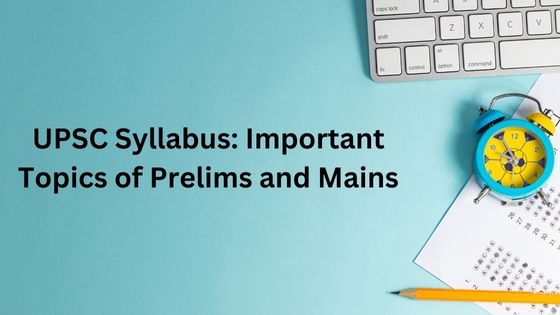It is most important to know about the syllabus at the beginning of preparation. It helps you to create plans and long-term/short-term goals. There are three stages of the UPSC Exam that are Prelims, Mains, and Interview. As you know that every year the number of UPSC applicants is increasing, but seats are limited. To filter not serious candidates, the Union Public Service Commission conducts the Prelims Exam. Only those applicants who will get minimum qualifying marks in the Prelims Exam can appear in the Mains Exam (Second Stage of UPSC Exam).
General Study Paper I and II are two subjects in Prelims Exam. GS Paper II is known as Civil Services Aptitude Test, and passing this exam is not easy. It is advisable for the applicants that before attempting CSAT questions, they study UPSC CSAT Syllabus in detail and understand the important topics. Below, we have added exam-wise important topics to help candidates for the IAS exam.
UPSC Syllabus Topics to Cover During Preparation
It is not new to know that UPSC Syllabus has two categories. The first category is the Prelims exam syllabus, and the second category is the Mains exam syllabus. Undoubtedly, there are differences between these two exams in terms of questions, number of papers, etc. Below, we have added major topics of both exams, so aspirants do not miss them.
Prelims Syllabus Topics
According to the UPSC Preliminary exam syllabus, questions will be related to logical, analytical, reasoning abilities, etc. There will be two parts of Prelims – General studies I and II.
- GS Paper 1 Topics – Current Affairs, Geography, Economics, environment, polity, etc. (100 questions)
- GS Paper 2 Topics – Governance, Constitution, Polity, Social Justice, and International relations. (80 questions)
Candidates face 180 questions for 400 marks. For these questions total 4 hours (2 hours for each paper) will be given to them. Remember, this exam is mandatory to pass, and the score won’t be added to the final results. Aspirants who get 33% marks in this exam pass this and qualify for the Mains exam.
Mains Syllabus Topics
The Nature of the UPSC Mains Exam is descriptive. Candidates write long answers (300+ words) to questions. It needs a candidate’s point of view, deep thought skills, and ability to present their answer in an impressive way. There are 9 different papers. Topics like comprehension, Essay writing, vocabulary, and translations are parts of In Paper A and B. However, candidates will have the choice to write an essay according to their choice.
- Literature, Freedom stages in history, Post-independence condition of India, World War, Evolution of Politics and their effects on society, etc.
- Global relations, constitution, social justice, and other political issues.
- Disaster Management, Earth & its Ecosystems, Economics, Internal Security, etc.
Besides these topics, candidates must read about Ethics & Aptitude and other topics in optional papers.
CSAT Topics and Tips
At last, we will mention some topics related to Civil Services Aptitude Test. Candidates prepare hard for this, but due to proper guidance and knowledge of important topics, they fail. Below, aspirants can find the topics and tips to pass the CSAT paper with the required marks.
1. Grammar – Comprehension vocabulary, translation, and identifying the errors are the topic covered under English grammar. It tests a candidate’s knowledge of the English language.
Tip – To answer questions in this section, you need to practice every day. Undoubtedly, it needs proficiency in the English language. It does not come overnight. Read newspapers and magazines in the English language and try to write on a topic in English.
2. Maths and Reasoning – Questions related to logical reasoning, coding, decoding, table chart, puzzles, LCM, HCF, and many topics will be asked in Civil Services Aptitude Test. It will be challenging to answer for candidates who are weak in maths.
Tip – Take 5 to 6 questions daily and try to solve them on your own. Understand the concept of that question and practice as much as you can.




















